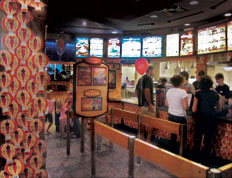Although the down economy has forced many operators to focus on the nitty gritty of business details and ignore the outside-the-store activities, customers still expect brands to stand for a good cause. According to the 2010 Cone Cause Evolution Study, which analyzes consumers’ expectations and behaviors toward companies’ support of causes, 82 percent of Americans believe it’s important for the food and beverage industry to support social or environmental causes.
The economic downturn, it seems, is no excuse to decrease community involvement. In fact, the Cone study reveals that 31 percent of Americans have higher expectations for companies to support causes during the recession—up from 26 percent in 2008.
“Trust among consumers of corporations, government, and other institutions has significantly declined during the recession. One way for corporations and even smaller businesses to regain that trust and to change perceptions of consumers is through support of a nonprofit organization or cause,” says Gail Bower, president of Bower & Co. Consulting LLC, a corporate sponsorship consultancy.
Andrew Valkanoff, owner and operator of MAD Treats Inc., which operates three Dairy Queen stores in the Raleigh, North Carolina, area, says his company sponsors about 35 fundraising events annually, each benefiting various local charities such as school youth groups and children’s hospitals.
“It’s very easy in the restaurant world to put on your restaurant eyes and not see beyond the four walls other than what comes in on a daily basis,” Valkanoff says. He considers his community involvement a responsibility and says that it does add a level of trust to his company.
“We understand that Dairy Queen is a brand, but it localizes the operator and the company as being a local company,” Valkanoff says. “It reinforces that we’re here locally; we’re not some big conglomerate that’s out there just eating off the community.”
Eric Clark, COO of New York City–based salad and sandwich concept Tossed, says community and charitable involvement is a responsibility. He says the corporate level strongly encourages each Tossed franchisee to give back from the moment they open the doors to a new store.
“Being a restaurant in a particular market does not really make you part of the community if you do not participate in making it a better place,” Clark says. “For every opening to date, we’ve partnered with a local charity by encouraging individual franchisees to choose a cause they feel a connection to.”
Valkanoff says it’s easy for quick serves to get involved in their local communities. “Getting started is easy—it’s saying ‘yes,’” he says. “It’s saying ‘yes’ to a crazy idea that someone has or saying ‘yes’ to finding a way to make an impact. Every day I get an e-mail from someone requesting help. You have to listen for the opportunities that make the most sense.”
While it’s clear that customers expect restaurants to give back, many operators may wonder what’s in it for them. Bower says there is strong marketing and sales potential in cause marketing. While some businesses may question the integrity of cause marketing, the Cone study confirms that 88 percent of Americans say it’s acceptable for companies to involve a cause or issue in their marketing.
“Partnering with the right charitable organization can yield tremendous marketing advantages to the quick-service restaurant,” Bower says. “Structured properly, the partnership can help drive traffic, increase sales, or even engage customers through social media and other avenues.”
Ideally, quick-service restaurants should strive to meet business objectives through their community involvement efforts, Bower says. In addition to increasing sales, these may include encouraging trial of a new product or creating opportunities important to employees, such as volunteering. She suggests two guidelines to help operators in structuring these partnerships. First, she says, define the outcome or results you hope to achieve through partnering with a cause.
“Even if the goal is increasing community goodwill, strive to be clear on what that looks like,” Bower says.
The next step is to select the right partner. “You want to be sure that the charitable organization you select is willing and able to work with you as a partner, not just take your check,” Bower says. “Are they helping you develop high-impact ideas to help you meet your goals? Working with the right partner can mean the difference between great success and no results.”
Valkanoff warns that once you become known as a company that supports community causes, expect to be overwhelmed with requests. “You have to be prudent about what your company mission is,” he says.
Bower says it becomes a lot easier to decide on causes when you align your charitable mission with your brand values. “Your brand stands for something, and that’s why your quick-service restaurant attracts the customers you have,” Bower says. “Partner with organizations representing causes that enhance the life of your customers and that don’t conflict with customers’ and the cause’s values.”
At Tossed, Clark says the majority of customers are women, making the company’s involvement in Susan G. Komen for the Cure, a worldwide breast cancer advocacy organization, a natural fit.
Dara Richardson-Heron, CEO of Komen Greater NYC, says Tossed has raised more than $2,500 to help fund local breast health programs by selling its salad dressings in bottles.
“When a woman reaches for the bottle of Sherry Wine Vinaigrette bearing the Komen Greater NYC logo, she’ll be reminded of the importance of breast self-awareness, self-exams, and annual mammograms because early detection is truly the best protection,” she says.
Bower says involvement in one’s community can be very meaningful, both on personal levels to leaders and employees, and to the brand and restaurant itself. But, she says, it must be done wisely.
“This sort of partnership is highly qualitative and should be engaged as a long-term strategy, not as a quick fix for slow sales,” she says. “Choosing the right nonprofit partner, developing a solid strategy, and executing measurable tactics will yield win-win-win results.”










